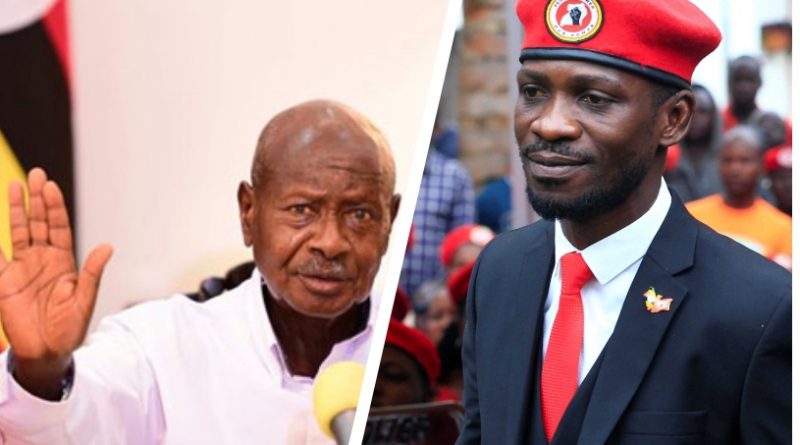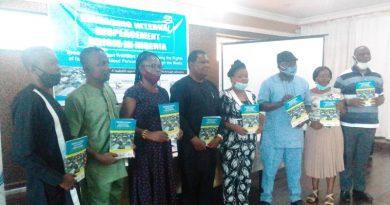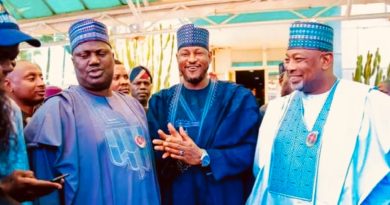UGANDA ELECTION: Musevenni declared winner as Bobi Wine alleges widespread fraud, violence
The incumbent president, Yoweri Museveni has been declared winner of the presidential election on Saturday by the Uganda’s electoral commission, extending his 35-year rule as his main rival Bobi Wine alleged fraud and urged citizens to reject the result.
Museveni secured 5.85 million votes, or 58.64 percent, of the total votes cast, while main opposition candidate Bobi Wine won 3.48 million votes or 34.83 percent, the commission said in a televised news conference on Saturday. The voter turnout was 52 percent.
“The electoral commission declares Yoweri Museveni … elected president of the republic of Uganda,” said Chairman Justice Simon Mugenyi Byabakama.
He has ruled Uganda without pause since seizing control in 1986 when he helped to end years of tyranny under Idi Amin and Milton Obote.
Once hailed for his commitment to good governance, the former rebel leader has crushed any opposition and twisted the constitution to allow himself to run again and again.
And for many in the country, where the median age is 16, Museveni’s glory days are no longer relevant or sufficient.
But the 76-year-old — one of Africa’s longest-serving leaders — has never lost an election and observers expect this time around was not different.
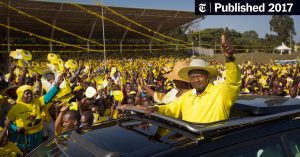
The President campaigned for a sixth term, arguing his long experience in office makes him a good leader while promising to keep delivering stability and progress. He will now serve his sixth term in office, having ruled for almost four decades, and his main rival among 10 opposition candidates is Wine, whose popularity among a youthful population has rattled the former rebel leader.
Uganda’s opposition leader Bobi Wine said the country’s election had seen “widespread fraud and violence”, as votes trickled in Friday under an internet blackout.
The 38-year-old former popstar-turned-MP did not give details about his accusations, which contradicted the government’s account that Thursday’s vote had been largely peaceful.
The internet remained down for a third day as vote counting continued, with provisional results from 24 per cent of polling stations giving President Yoweri Museveni an early lead of 65 per cent while Wine trailed with 27 per cent.
The capital Kampala was quiet and some businesses remained closed, while soldiers and police patrolled on foot the day after the election.
Voting in Kampala took place under the oppressive security presence of soldiers and riot police in the streets and at polling stations.
The election followed the most violent campaigns in years, with harassment and arrests of the opposition, attacks on the media and scores of deaths.
However, election commission chief Simon Mugenyi Byabakama said the vote had gone off in a “peaceful and tranquil manner”.
Police spokesman Fred Enanga said there had been “no major cases of violence reported.”
But a senior foreign diplomat said there had been sporadic incidents of violence and many irregularities but no sign of mass manipulation.
The US, EU, UN and global rights and democracy groups have raised concerns about the integrity and transparency of the election.
Only one foreign organisation, the African Union (AU), has sent monitors, along with an AU women’s group.
On Wednesday, the United States, a major aid donor to Uganda, announced it was cancelling a diplomatic observer mission after too many of its staff were denied permission to monitor the election.
His opponents — most visibly Bobi Wine, who spent much of the campaign in a bulletproof vest and combat helmet — were arrested, blocked from rallying and dispersed with tear gas throughout the campaign.
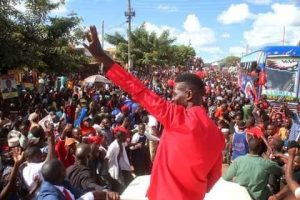
Bobi galvanised young Ugandans with his calls for political change and pledged to end what he calls dictatorship and widespread corruption, had vowed non-violent street protests should Ugandans feel the election was stolen, claimed poll win earlier despite lead for Museveni
However, Museveni had warned that using violence to protest the result would amount to “treason”.
In an evening address to the nation, Museveni dismissed the allegations of fraud and said Thursday’s polls may turn out to be the “most cheating-free” in Uganda’s history.
The results were announced as Bobi Wine was under heavy guard at his home on the outskirts of the capital, Kampala, with his party saying he was under “effective house arrest” and the government saying it was merely providing him with security.
They also followed one of the bloodiest campaigns in years, with harassment and detentions of opposition figures, attacks on the media and the deaths of at least 54 people in protests in November, on one of the multiple occasions when Bobi Wine was arrested.
Security personnel and police were out in force patrolling Kampala on Saturday. The government ordered the internet shut down the day before the election, and the blackout was still in place.
Bobi Wine, a singer-turned-lawmaker whose real name is Robert Kyagulanyi, said on Friday he had video proof of voting fraud and would share the videos as soon as internet connections were restored. He accused Museveni of fabricating the results and called the poll “the most fraudulent election in the history of Uganda”.
The Punch Newspapers had also reported the withdrawal of Bobi’s personal guards who had been with him for twelve, which claimed to be a directive from above.
Police recorded 42 election-related offences nationwide during voting and tallying so far, police spokesman Fred Enanga said on Friday night on local NBS TV. Offences included assaults, voter bribery, and theft and damage of electoral materials, he said.
(Credit: Aljazeera and Punch)

